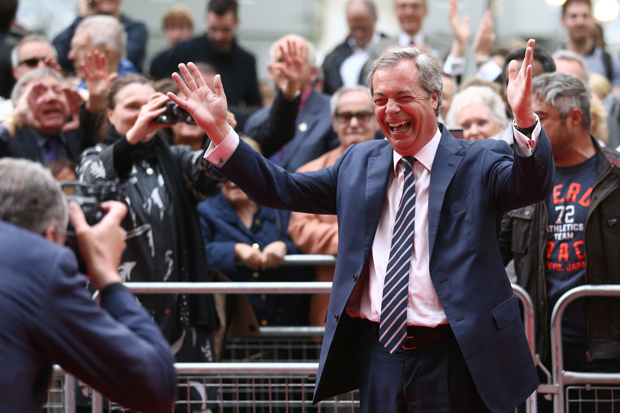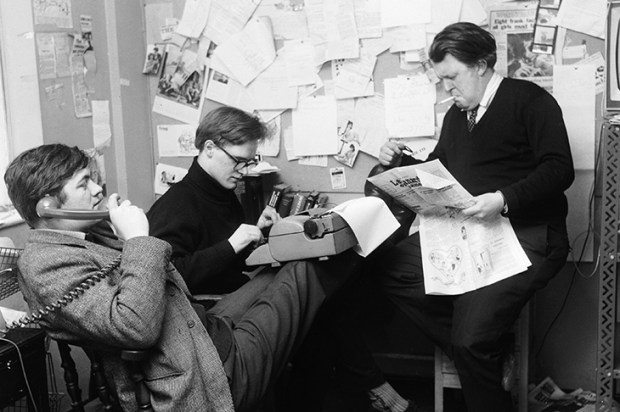Like a lot of keen games-players I’m a stickler for the rules. This is not because I’m an especially honourable person; merely a recognition that without a rigorous structure and a sense of fair play, a game can be no fun and winning can afford no satisfaction.
I feel much the same way about politics. Take Hilary Benn’s recent contribution to the Brexit debate, wherein he professed to have taken grievous offence at Boris Johnson’s use of the word ‘Hitler’ in an article about Europe. As was perfectly clear from the context, the reference was dropped in lightly and unhysterically in the service of an unexceptionable point. So the game Benn was playing there definitely wasn’t cricket. It was more like diving in the penalty area and appealing to the ref when the player who supposedly fouled you isn’t even close.
Is this a sensible way to fight a campaign? Possibly: we won’t know for sure until the votes are in. But if I were an undecided wondering where to place my X, I think the thing that would swing it for me would be the marked difference in tone between the two camps — with the Remainers coming across as shrill, prickly and bitter, and the Brexiters surprisingly sunny, relaxed and optimistic.
This isn’t what you might have expected at the start of the campaign. Really, it makes no sense. When you’re the odds-on favourite with the weight of the global elite behind you — Obama, Lagarde, Goldman Sachs, the BBC, Ed Balls — you ought to be able to afford to be magnanimous, jolly and decent. It’s the anti-EU rebels, the spoilers, the malcontents, you’d imagine would be most afflicted by rage, spite and peevishness.
But it hasn’t turned out that way. Yes, there has been some vicious factional backbiting between the different Brexit camps, I can’t deny that. The tone of their campaigning, though, has been almost weirdly upbeat: Boris larking about with Cornish pasties and angle-grinders; Gove batting off Marr with his effortless good cheer; Farage with his pint-and-fags common touch; Martin Durkin with his insightful, inspirational and often very funny crowd-funded documentary Brexit: the Movie.
Brexit: the Movie. With a title like that you’d know exactly what to expect: mostly middle-aged and elderly men, banging on about how much better things were when the atlas was coloured pink, all jingoism and xenophobia and thinly disguised racism. Except that’s not the film Durkin has made. (It’s free on YouTube or Vimeo, so see for yourself.)
Yes, the empire is referenced: but only to make the point that, contra the Remainers, our tiny rainswept island is quite capable of making its mark on the global stage without the help of its continental neighbours. And yes many of the talking heads are chaps of a certain age — one being me — but let’s not engage in ad homs or identity politics: let’s thrill, instead, to their glorious vision of how Britain might look when freed from the shackles of the EU.
Like Switzerland, basically, where the GDP per capita is almost twice what it is here. Or like the Germany which rose from the ashes after the second world war to become the world’s third-largest economic power. The way both countries achieved this is so obvious you wonder why all those economists who preach otherwise still have a job: by cutting red tape and letting businesses get on with the business of raising everybody’s living standards.
What, meanwhile, are the Remainers offering us? More of the same old same old. It’s an instinct I can well understand. The familiar is very comforting, as we learned earlier this month in another context from a man named Albert Woodfox who’d been released after 43 years in a Louisiana penitentiary, most of it spent in solitary in a 6ft by 9ft concrete box. ‘In a cell you have a routine, you pretty much know what’s going to happen… So there are moments when, yeah, I wish I was back in the security of a cell. I mean, it does that to you,’ he said.
I feel much the way towards the Remainers as I do towards poor Albert: pity and sympathy, rather than hatred. But this generosity of spirit is not something I’ve seen much reciprocated towards Brexiters. David Cameron set the tone right at the beginning, by making it clear to the Commons that the only possible reason Boris could have for voting Brexit was as a dirty, underhand means of becoming Prime Minister: an appeal to emotion, not reason. Since that moment we’ve had almost nothing but vicious negativity from the Remain camp: the scaremongering of Project Fear; the daily piling on of dire warnings from supposedly neutral authorities, such as the Governor of the Bank of England; the needling tweets and spiky, sneering articles from the kind of people one normally thinks of as affable and funny, such as Nicholas Soames and Ferdinand Mount. It’s as if the entire Remain camp has been infected with a virus which has sucked out all their joie-de-vivre, their sense of fair play and their lightness of touch.
They say the same thing about us, I know they do. But I think that’s more a case of what psychologists call ‘projection’. Certainly, the thing that struck me above all at the Brexit: the Movie premiere the other night was what an incredibly jolly, likable bunch the assembled luminaries were. They weren’t pretending to have fun, as you generally do on these occasions. These were people genuinely happy in their skin, united in a cause whose merits they had considered carefully and knew to be just. I don’t want to undermine my entire piece by being too much of a bitch here, but I’ve got to ask: is that really something you could say of anyone in the Remain camp?
Got something to add? Join the discussion and comment below.
Get 10 issues for just $10
Subscribe to The Spectator Australia today for the next 10 magazine issues, plus full online access, for just $10.
You might disagree with half of it, but you’ll enjoy reading all of it. Try your first month for free, then just $2 a week for the remainder of your first year.















Comments
Don't miss out
Join the conversation with other Spectator Australia readers. Subscribe to leave a comment.
SUBSCRIBEAlready a subscriber? Log in